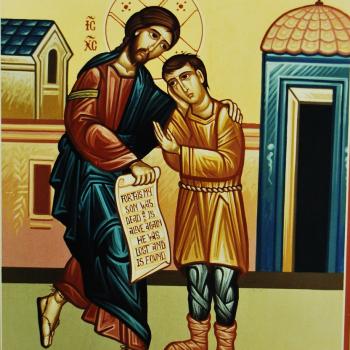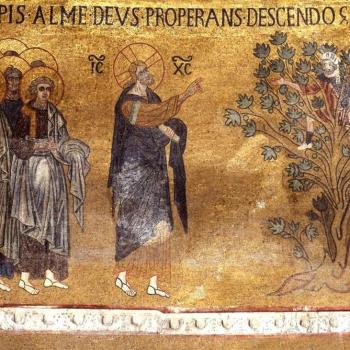
Christian should be concerned with and hope for the salvation of everyone, not just other Christians. Certainly, Christ offers salvific grace to those who believe in him. He expects believers to cooperate with that grace and follow after him for it to be fully activated. But, when they follow after him, they will listen carefully to what he said, and do as he told them to do. They would love him and prove that love through their actions. And what does Jesus tell them to do? Take the love they have received, and the grace which comes with it, and share it with everyone else, helping everyone to receive their share of God’s love and the grace which comes with it. They would share with Jesus God’s love for the world, desiring that all should be saved, whether or not someone is themselves a believer. Christians have received grace, and through it, can and should find salvation; however, they should not think God has some sort of limit as to who can or cannot receive such grace, as if there were someone God was not calling to salvation. Everyone is called, believers and non-believers alike, as God brings salvation to all: “For to this end we toil and strive, because we have our hope set on the living God, who is the Savior of all men, especially of those who believe” (1 Tim. 4:10 RSV).
Jesus came to save everyone; there is no “limited atonement.” The saving work on the cross is for everyone. Indeed, what he did was not just for humanity, but for all creation. Those who believe in him will do what he said, open themselves up to grace, and find salvation; in this fashion they can even be said to be the first to receive salvation. But they must be careful and not presume that salvation is exclusively theirs, that is, salvation is only to had by those who explicitly know the Christian faith and believes in it. Salvation is offered to the world, which means, many who do not explicitly know the faith still have implicit ways to know Christ, and through them, to be connected with him and receive his grace. This is exactly the point Jesus made in his parable about the Last Judgment, for in it, many who appeared not to know Jesus and have no relationship with him are shown to have had an implicit relationship with him due to the way they lived out their lives in charity, and through such charity, receive grace and salvation. On the other hand, Jesus also warned that those who have faith, those with explicit knowledge and belief in him, are not guaranteed salvation, for if they resist the way he would have them be, if they resist the life of charity, they might cut themselves off from grace and risk not being saved.
Jesus indicated that salvation was not based upon what one knew, so that one should not presume salvation because they know the dogmas of the faith. Christians should not presume that those who have no explicit knowledge of the faith, especially those who appear to be great sinners, are irredeemable. They should not unjustly judge and condemn others. The result of the eschatological judgment of history has not been revealed. What they should know is that Jesus has worked for the salvation of all, not just those who are believers. God is the savior of all. Public sinners, or at least, those who are deemed such, are ones Christ has come to save, which is why he could and would go to someone viewed as immoral and degenerate as a tax collector (for tax collectors were considered among the worst due to the ways they collected taxes from the people). We see this in play when he went to Zacchaeus and his house:
He entered Jericho and was passing through. And there was a man named Zacchaeus; he was a chief tax collector, and rich. And he sought to see who Jesus was, but could not, on account of the crowd, because he was small of stature. So he ran on ahead and climbed up into a sycamore tree to see him, for he was to pass that way. And when Jesus came to the place, he looked up and said to him, “Zacchaeus, make haste and come down; for I must stay at your house today.” So he made haste and came down, and received him joyfully. (Lk. 19:1-6 RSV).
Zacchaeus was not just a tax collector, he was one of the chief tax collectors, and that made him rich. Tax collectors received a share of the taxes they collected, and so, they had a tendency to impose strict tax burdens upon others, especially upon those who could resist them the least, that is, the poor. That is, tax collectors became rich upon the backs of the poor. For the situation to be made just, all those who unjustly took from the poor would need to make reparations and do what they can to help protect the poor in the future. And, it would seem, before his encounter with Christ, Zacchaeus had not done so, which is why many were upset when Jesus said he would go and be with him as it seemed to them that Jesus approved of Zacchaeus and the way he conducted his tax collection: “And when they saw it they all murmured, ‘He has gone in to be the guest of a man who is a sinner’” (Lk. 19:7 RSV).
And yet, there was more than met the eye. Zacchaeus’s desire to see Jesus had brought him face to face with Jesus. That desire showed that he was not completely corrupted, that there was still some good in him. And, when he met with Jesus, he embraced that good and repented of what he had done. Welcoming Jesus into his home was an external representation of what was going on within, for Zacchaeus welcomed the way of justice and grace into his life. The one whom the public thought was an irredeemable sinner had a change of heart. He was convicted of his sins, and he was willing to do what justice indicated he should do:
And Zacchaeus stood and said to the Lord, “Behold, Lord, the half of my goods I give to the poor; and if I have defrauded any one of anything, I restore it fourfold.” And Jesus said to him, “Today salvation has come to this house, since he also is a son of Abraham. For the Son of man came to seek and to save the lost” (Lk. 19:8-10 RSV).
Salvation came to him, a sinner, one whose way of life used every means possible to collect taxes from those who had little to no means to pay it. He saw what he had become, and he saw he must change. To start, he vowed to make amends to those whom he had unjustly hurt. He was willing not only to engage the dictates of justice and restore what he had unjustly taken from others, but to give more in return than he had taken. He turned away from his previous greed and embraced the way of charity, the way of love, and so the way of salvation. He who had been inhospitable, upon welcoming Jesus into his home, took on the hospitality of Abraham and so truly became a “son of Abraham” in deed.
Jesus is always going to those who are lost, to those whom religious people otherwise hate, giving them the chance for salvation. History show how often religious people get in the way of grace. But Jesus made it clear, he loved everyone. This is not to say people should stay as they are. Jesus, when he comes to them, offering grace, brings with him the means to bring about change. That change must include an embrace of the way of love. The more people welcome Jesus and his grace, the more they must become like him, sharing grace with others, doing so with true love and charity. They must be willing to look at anyone and everyone as one whom Jesus loves, as one whom Jesus came to save, whether or not they are a believer, for only then can they truly understand the way of Jesus and what it means to be his disciple.
Stay in touch! Like A Little Bit of Nothing on Facebook.
If you liked what you read, please consider sharing it with your friends and family!
N.B.: While I read comments to moderate them, I rarely respond to them. If I don’t respond to your comment directly, don’t assume I am unthankful for it. I appreciate it. But I want readers to feel free to ask questions, and hopefully, dialogue with each other. I have shared what I wanted to say, though some responses will get a brief reply by me, or, if I find it interesting and something I can engage fully, as the foundation for another post. I have had many posts inspired or improved upon thanks to my readers.












